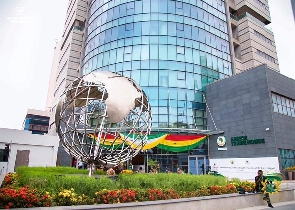Ghana did beat other competing countries including Egypt, Eswatini, Ethiopia, Kenya, Madagascar and Senegal to win the bid to host the secretariat of the African Continental Free Trade Area. A great news to the average Ghanaian, member countries of the AfCFTA have agreed not to impose tariffs, quotas and other trade barriers on goods and services.
The agreement is meant partly to encourage the expansion of markets and diversify exports specifically manufactured goods instead of the raw material export which Africa is known for.
The core mandate of the secretariat is to implement the free trade agreement, which 36 out of 54 countries have deposited their instrument for ratification as at 5th February, 2021. The good news is that, it will create the world’s largest free trade area since the formation of the World Trade Organization in 1995, once all African countries have ratified the deal.
Africa’s free trade area will cover a market of 1.2 billion people with a combined Gross Domestic Product (GDP) of US$2.5 trillion.
Part of the secretariat’s job will be to recruit personnel, train them and develop organization capability. Also, the secretariat will have to implement policies handed down by the governing body, keep the media engaged, organize conferences and identify potential funding sources. But most importantly, it will monitor and evaluate the progress of policies and programmes.
For the record, this is the first of its kind for Ghana which has never hosted any continental secretariat. Our hope is that, Ghana can emulate the success of other African capitals that have profited from hosting the AU and the United Nations. Addis Ababa is home to the AU whilst Nairobi hosts two of the United Nation’s biggest bodies.
The presence of the headquarters of the AU in Addis Ababa has been credited with an increase in property valuations as well as job creation.
In making its bid, Ghana took advantage of its strategic geographical location in West Africa. It has put a great deal of effort into making the country a gateway and a trade hub in West Africa.
Hosting the free trade area secretariat will come with costs and benefits - direct and indirect.
But until Ghana fixes her transportation infrastructure deficit, starting from making it a priority to facilitate trading activities.
You cannot import and export without transportation infrastructure. So, for those of us who are at the coast, we need very good ports to be able to handle big projects; ensuring that ports work very well is important. Therefore, those who are inland [landlocked countries] need other means of carrying freight such as rail, road or air infrastructure – these are pretty costly – there should be an air agreement over Africa.
AfCFTA
The Continental Free Trade Agreement (CFTA) is an Africa-wide free trade agreement (FTA) designed to boost intra-African trade and pave the way for the future establishment of a continental customs union.
The CFTA builds on existing Tripartite FTA negotiations amongst three African regional economic communities (RECs): The Southern African Development Community (SADC), the Common Market for Eastern and Southern Africa (COMESA) and the East African Community (EAC), although it would like to incorporate all other African RECs too.
The decision to establish the CFTA was adopted as early as 2012 by the heads of state at the 18th ordinary session of the African Union (AU), and negotiations officially begun in June 2015.
AfCFTA brings together 54 African countries with a combined Gross Domestic Product of more than US$3.4 trillion.
Opinions of Tuesday, 6 April 2021
Columnist: Kwesi Atuahene
Till Ghana fixes her transportation infrastructure deficit, she won’t benefit much from AfCFTA
Entertainment














